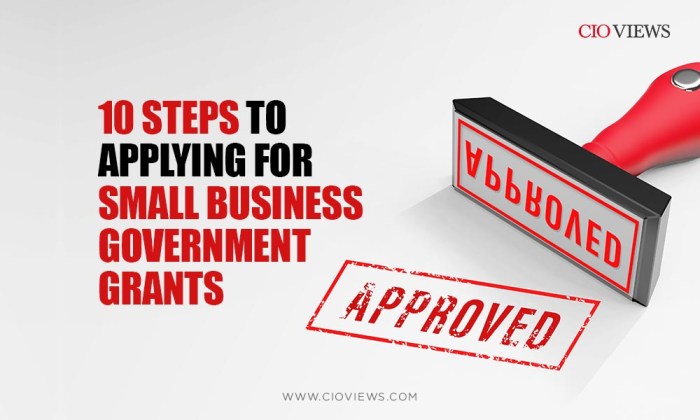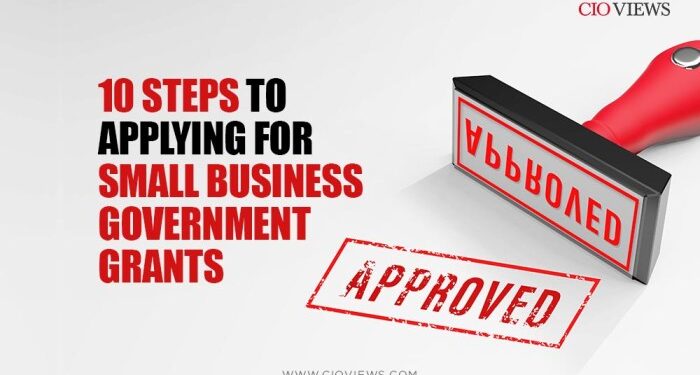Embarking on the journey of securing government grants for small businesses opens up a world of opportunities and financial support. Understanding the intricate process and requirements can make all the difference in successfully obtaining these grants. Let's delve into the essential steps and crucial information needed to navigate this realm effectively.
Researching Government Grants
Researching government grants for small businesses is crucial to accessing funding opportunities that can help your business grow and succeed. Here are some key points to consider:
Types of Government Grants
- Federal Grants: Offered by government agencies at the federal level to support various business initiatives.
- State Grants: Provided by state governments to promote economic development within their respective regions.
- Local Grants: Offered by local municipalities or organizations to support small businesses in the community.
Where to Find Information
- Government Websites: Visit official government websites such as Grants.gov, SBA.gov, or your state's economic development department website.
- Local Resources: Contact local small business development centers, chambers of commerce, or economic development agencies for information on available grants.
Tips for Determining Eligibility
- Review Criteria: Understand the specific requirements and criteria for each grant program to determine if your business qualifies.
- Check Restrictions: Be aware of any restrictions on how grant funds can be used and ensure your business complies with the guidelines.
Importance of Understanding Grant Requirements
- Compliance: Failure to meet grant requirements can result in disqualification or repayment of funds, so it's essential to fully understand all obligations.
- Preparation: Knowing the grant requirements in advance allows you to prepare a strong application that aligns with the goals of the funding program.
Preparing to Apply

When applying for government grants for small businesses, it is crucial to be well-prepared with all the necessary documents and information. Having a solid business plan, ensuring the business meets specific criteria, and gathering financial statements are key steps in the application process.
Documents and Information Needed
- Legal business name and structure
- Tax identification number
- Contact information
- Certifications and licenses
- Brief description of the business
Importance of a Solid Business Plan
A well-thought-out business plan is essential when applying for government grants as it demonstrates the viability and potential of the business. It should include details about the products or services offered, target market, competition analysis, marketing strategies, and financial projections.
Meeting Specific Criteria
Before applying for grants, make sure to carefully review the eligibility criteria set by the government agencies. Some grants may have specific requirements related to the size of the business, industry focus, location, or other factors. Ensure that your business meets all the necessary criteria before submitting the application.
Gathering Financial Statements and Paperwork
- Income statements
- Balance sheets
- Cash flow projections
- Business tax returns
- Personal financial statements of owners
It is important to gather all the required financial statements and paperwork to provide a comprehensive overview of the business's financial health and stability. Make sure all documents are up-to-date and accurate to increase the chances of securing a government grant
Applying for Government Grants
Applying for government grants for small businesses can be a competitive process that requires careful attention to detail and a compelling grant proposal. Here's a breakdown of the application process and key tips for success.
Creating a Compelling Grant Proposal
When creating a grant proposal, it is essential to clearly Artikel your business idea, the problem it solves, and how the grant funds will be used to achieve your goals. Make sure to highlight the impact your business will have on the community or industry and clearly demonstrate the need for financial support.
Use data, statistics, and case studies to support your claims and make your proposal stand out.
Following Instructions Carefully
One of the most critical aspects of applying for government grants is following the application instructions carefully. Missing a required document or not adhering to formatting guidelines can result in your application being rejected. Take the time to review the application requirements thoroughly and ensure that you provide all the necessary information in the correct format.
Meeting Application Deadlines
Meeting application deadlines is crucial when applying for government grants. Set a timeline for completing each section of the application and allocate enough time for revisions and edits. Submitting your application ahead of the deadline can give you a competitive edge and show that you are organized and committed to your business venture.
Submitting a Complete Application
Before submitting your application, double-check that you have included all required documents, signatures, and supporting materials. Make sure that your proposal is clear, concise, and free of errors. Consider having a peer or mentor review your application to provide feedback and catch any mistakes you may have missed.
Post-Application Steps
After submitting a government grant application for your small business, it is important to stay proactive and informed about the progress of your application. Tracking the status of your application, knowing what to do if it gets approved or denied, and understanding how to make the best use of the grant if approved are crucial steps to take.
Tracking Application Progress
Once you have submitted your application, you can typically track its progress through the government agency's online portal or by contacting the appropriate department directly. Make sure to keep a record of any correspondence or updates regarding your application.
Approval or Denial of Application
- If your application is approved, congratulations! Be sure to carefully review the terms and conditions of the grant to understand how the funds can be utilized.
- In case your application is denied, don't be discouraged. You can request feedback on why it was rejected and use this information to improve your future applications.
Utilizing the Grant Effectively
Once you receive the grant for your small business, it's essential to use the funds wisely to maximize their impact. Consider creating a detailed budget and plan on how you will allocate the grant money to achieve your business goals.
Last Point
As we wrap up our discussion on applying for government grants for small businesses, it's important to remember that thorough research, meticulous preparation, and strategic post-application steps are key to maximizing your chances of success. By following these guidelines, you can position your business to thrive and grow with the assistance of government grants.
FAQ Summary
What types of government grants are available for small businesses?
Government grants for small businesses can vary from industry-specific grants to general funding opportunities aimed at fostering entrepreneurship.
Where can I find information about government grants for small businesses?
Information about government grants for small businesses can be found on official government websites, small business development centers, and grant databases.
Why is having a solid business plan important when applying for grants?
A solid business plan showcases your business's potential and how grant funding will contribute to its growth and success, increasing your chances of securing the grant.
How can I track the progress of my government grant application?
Tracking the progress of your application can typically be done through the grant provider's online portal or by contacting the grant administrator directly.
What should I do if my government grant application is denied?
If your application is denied, it's essential to review the feedback provided, make necessary improvements, and consider reapplying in the future with a stronger application.












